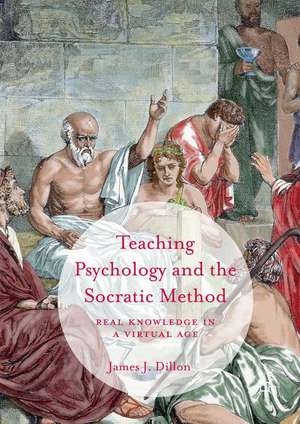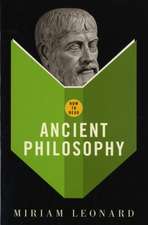Teaching Psychology and the Socratic Method: Real Knowledge in a Virtual Age
Autor James J. Dillonen Limba Engleză Hardback – 18 noi 2016
| Toate formatele și edițiile | Preț | Express |
|---|---|---|
| Paperback (1) | 578.37 lei 6-8 săpt. | |
| Palgrave Macmillan US – 23 iun 2018 | 578.37 lei 6-8 săpt. | |
| Hardback (1) | 582.80 lei 6-8 săpt. | |
| Palgrave Macmillan US – 18 noi 2016 | 582.80 lei 6-8 săpt. |
Preț: 582.80 lei
Preț vechi: 685.65 lei
-15% Nou
Puncte Express: 874
Preț estimativ în valută:
111.53€ • 116.01$ • 92.08£
111.53€ • 116.01$ • 92.08£
Carte tipărită la comandă
Livrare economică 15-29 aprilie
Preluare comenzi: 021 569.72.76
Specificații
ISBN-13: 9781349950492
ISBN-10: 1349950491
Pagini: 209
Ilustrații: VI, 209 p.
Dimensiuni: 148 x 210 x 19 mm
Greutate: 0.39 kg
Ediția:1st ed. 2016
Editura: Palgrave Macmillan US
Colecția Palgrave Macmillan
Locul publicării:New York, United States
ISBN-10: 1349950491
Pagini: 209
Ilustrații: VI, 209 p.
Dimensiuni: 148 x 210 x 19 mm
Greutate: 0.39 kg
Ediția:1st ed. 2016
Editura: Palgrave Macmillan US
Colecția Palgrave Macmillan
Locul publicării:New York, United States
Cuprins
Why We Teach .- Who Is Socrates and Why Should We Read Him? .- The Socratic Method .- Socrates Structures the Course .- Teaching Neuroscience with Phaedo .- Teaching the Psychology of Memory with Phaedo .- Teaching the Psychology of Learning with Meno .- Teaching Sensation-Perception Psychology with De Anima .- Teaching Cognitive Psychology with De Anima .- Academic Conference #1: Psychology and the Body .- Teaching Developmental Psychology with Republic .- Teaching Moral Development with Theaetetus .- Teaching Abnormal Psychology with Nichomachean Ethics .- Teaching Psychotherapy with Phaedrus .- Academic Conference #2: Good, Better, Best in Psychology .- Teaching Personality with Apology .- Teaching Social Psychology with Crito .- Teaching Motivation & Emotion Psychology with Euthyphro .- Academic Conference #3: What Is the Self? .- Omnibus Academic Conference: The Socratic Method.
Recenzii
“James J. Dillon argues that we need to focus more on helping students learn how to think and less on content that they are likely to forget anyway. … Dillon’s purpose is to present a unique plan for integrating the Socratic method into a psychology course. … I recommend that psychology faculty read Teaching Psychology and the Socratic Method. It is likely to stimulate some thought about how best to stimulate thought in our students.” (David S. Kreiner, PsycCRITIQUES, Vol. 62 (14), April, 2017)
Notă biografică
James J. Dillon is a psychologist and Professor at the University of West Georgia, USA. He specializes in the study of learning and development. He has coordinated many special learning communities for college students. In addition to his research and university teaching, Dr. Dillon is a certified public elementary school teacher.
Textul de pe ultima copertă
This book presents a lively and accessible way to use the ancient figure of Socrates to teach modern psychology that avoids the didactic lecture and sterile textbook. In the online age, is a living teacher even needed? What can college students learn face-to-face from a teacher they cannot learn anywhere else? The answer is what most teachers already seek to do: help students think critically, clearly define concepts, logically reason from premises to conclusions, engage in thoughtful and persuasive communication, and actively engage the franchise of democratic citizenship. But achieving these outcomes requires an intimate, interpersonal learning community. This book presents a plan for using the ancient figure of Socrates and his Method to realize humane learning outcomes in the context of psychology.
Caracteristici
Provides a research-based case for using the ancient figure of Socrates to teach modern psychology Effectively bridges psychology, education, and Socratic within this unique research and guide Contains a wealth of research, theory, and practical tools designed to help instructors use the Platonic dialogues in their classrooms
















